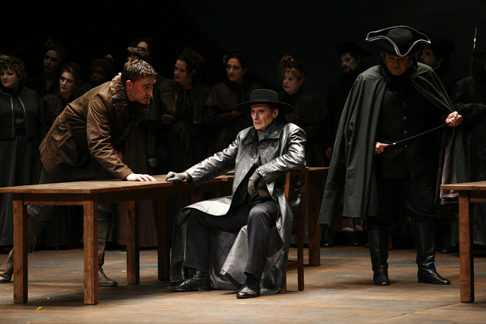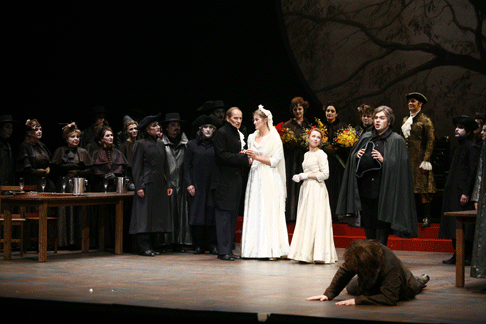06 Feb 2011
Der Freischütz, Toulon
Carl Marie von Weber’s magical masterpiece has had a hard time of it in France.

Carl Marie von Weber’s magical masterpiece has had a hard time of it in France.
In his memoirs Hector Berlioz heaps condemnation upon its 1824 premiere in Paris where it had been made over to appeal to Parisian (French) taste. Le Freischütz according to Berlioz was “mutilé, vulgarisé, torturé, insulté” — it had in fact even become Robin des Bois.
The usual sarcastic bombast of the memoirs is however absent when Berlioz describes his own transformation of the work. He composed sung recitatives to replace its spoken dialogues for its performances at the Paris Opera in 1841 — no spoken words at this altar of musical art!
Von Weber’s Romantic masterpiece has had a very hard time of it just now in Toulon (home of the French Mediterranean fleet, its magnificent opera house said the be the model for the Paris Opéra Garnier). Its extensive spoken dialogues had been somewhat restored (delivered in German by an international cast [there was one German] to this French speaking audience).
The metteur en scène in Toulon was sixty-three-year-old Jean-Louis Benoit, director of the Théâtre National La Creee-Marseille. He too re-wrote von Weber’s delicate masterpiece, translocating it from the enchanted forests of a mythical Germany to inside Max’s head, a space “urbanisé, métallique, no longer in need of a forest”[!] according to Mr. Benoit.
These days one has learned that it is dangerous to question the visions of stage directors, and anyway it is indeed true that all human perception occurs in someone’s head. Unfortunately Mr. Benoit and his scenic collaborator Laurent Pedruzzi did not have the vocabulary or technique to realize such a concept — the enchanted forest was reduced to a huge hanging circle, presumably a moon, the Wolf Glen was an empty stage, the forest ranger’s home was a bed.
Mr. Benoit’s actors moved presentationally in costumes that identified their character (some of the chorus wore metallic gray great coats), addressing themselves directly to the audience. Chorus movement was geometric and in direct relationship to the musical structure. The metallic urbanization seemed to make this production no more than a concert performance of one of the repertory’s most splendid scores.
Laurence Equilbey is one of the rare females admitted into the fraternity of conductors. Mme. or Ma. Equilbey took a very literal approach to this score, marking its beat stolidly and seldom allowed its music to take flight. In fact Ma. Equilbey seemed to be in contention with the stage from time to time when the music wanted it to take flight all by itself and she insisted on the beat.

This is not to say that we did not hear von Weber’s opera. The orchestra of the Opéra de Toulon approached the score with obvious respect, and responded to its conductor’s talents by giving a clean performance, if one lacking the tonal splendor of, let’s say, the Berlin Philharmonic.
Grave responsibility to create both character and music rests on the shoulders of concert singers. Berlioz noted that the Agathe of Robin des Bois was a lovely singer who delivered her great second act aria with “imperturbable sang-froid” and with all the charm of a vocalise. Much the same thing can be said of the performance of the Toulon Agathe, American soprano Jacqueline Wagner who applied the same sang-froid to Agathe’s lovely third act prayer as well.
Max, Agathe’s misguided fiancé, was entrusted to German tenor Jürgen Müller who combined sturdy singing with believable character. He managed to recover from some vocal malaise that marred the third act trio with Agathe and Ännchen to finish the opera in fine form. All in all he offered a splendid performance.

The Kaspar was sung by Moldovian bass-baritone Roman Ialcic who discovered the cunning of von Weber’s evil paysan but did not project its force. Mr. Ialcic too is a fine singer. Georgian bass Nika Guliashvili was too young to be Agathe’s father, and too green to portray the gravity the head forest ranger Kuno, Canadian soubrette Mélanie Boisvert was an appropriate Ânnchen.
Michael Milenski